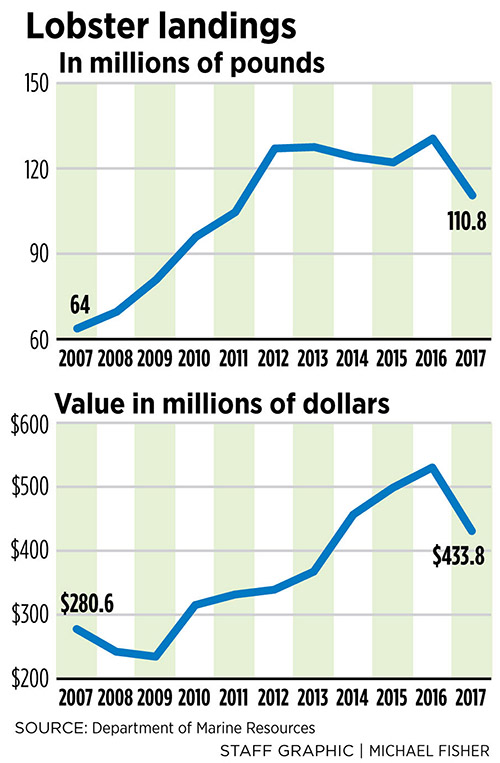Maine lobstermen landed at least 100 million pounds of the state’s signature crustacean in 2018, according to preliminary state data.
One industry member speaking at a global seafood show in San Diego on Thursday estimated the Maine industry had landed 119 million pounds.
But state Department of Marine Resources spokesman Jeff Nichols said it is too early to say if the landings will climb that high. The state is still auditing the monthly lobster dealer reports, and won’t be ready to release its official landings estimate until February, at the annual Fishermen’s Forum.
But Nichols confirmed that Maine’s 4,500 commercial harvesters had landed more than 100 million pounds for the eighth year in a row.
“Early indications suggest we had a very strong year,” Nichols said.
The state follows the $1.4 billion a year industry closely. It is Maine’s global brand, and it employs thousands of Mainers, many living where jobs are scarce.
In San Diego, the audience at the Global Seafood Market Conference learned Maine lobstermen had bested the 2017 catch in 2018, according to SeafoodSource, an online industry news and events company. Keith Moores, president of Gloucester, Massachusetts-based frozen seafood supplier J.W. Bryce, said Maine harvesters had landed about 119 million pounds, which would mean an 8 million pound increase over their 2017 landings of 110.8 million pounds.
“It was a very, very healthy harvest rate from Maine this year,” Moores told the audience during his presentation.
According to Moores, the unofficial Canadian lobster harvest was stable, at about 198 million pounds. That is about 2 million pounds shy of the 2017 landings.
Maine’s 2017 landings, valued at $434 million, were the lowest weight landed in five years. State officials and industry leaders attributed the decline to a short season caused by a late spring molt and bad winter weather. They called it a one-year dip from the highest year on record and emphasized that it didn’t signal the start of a population bust. Some scientists have forecast long-term declines because of warming waters and acidification.
But industry leaders say it is far too early to know if the lobster boom that began in 2012 is over. As the Gulf of Maine warms, the lobster population will move, they said. Just as that warming brought Maine the lobster boom, it will eventually lead to a smaller population in near-shore Gulf of Maine waters, but it is impossible to know when that decline might begin or how far landings might fall.
Penelope Overton can be contacted at 791-6463 or at:
poverton@pressherald.com
PLOvertonPPH
Copy the Story LinkSend questions/comments to the editors.




Success. Please wait for the page to reload. If the page does not reload within 5 seconds, please refresh the page.
Enter your email and password to access comments.
Hi, to comment on stories you must . This profile is in addition to your subscription and website login.
Already have a commenting profile? .
Invalid username/password.
Please check your email to confirm and complete your registration.
Only subscribers are eligible to post comments. Please subscribe or login first for digital access. Here’s why.
Use the form below to reset your password. When you've submitted your account email, we will send an email with a reset code.